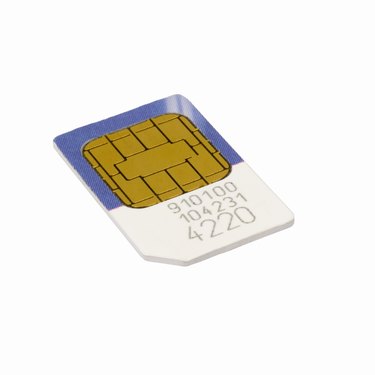
Your SIM card is a pretty amazing piece of technology: it tells the phone what network it belongs on, tells the network who the phone belongs to, and even offers a little space to store some data -- all on a chip the size of your pinky nail. While the amount of information that can be stored on a SIM pales in comparison to the capacity of a modern smartphone, if you change phones regularly it can be a good idea to store your contacts on your SIM card for portability.
What SIM Cards Do
Video of the Day
The SIM card contains your subscriber profile, which identifies your phone to the network. This consists of the integrated circuit card identifier, a form of account number; the international mobile subscriber identity, identifying which carrier the phone should use; and the authentication key, which connects the SIM with your wireless account. The SIM card can also store information about the state of the local network around it as well as a limited number of text messages and phone book contacts.
Video of the Day
A Brief History
Giesecke & Devrient manufactured the first commercially available SIM card in 1991, providing them to the Finnish wireless company Radiolinja. Originally the size of an ordinary credit card, SIMs were reduced in size as mobile phones became smaller and smaller. The 25-by-15-millimeter mini SIM arrived in the late 1990s followed by the 15-by-12-millimeter micro SIM in 2003 and the 12.3-by-8.8-millimeter nano SIM in 2012.
SIM Card Capacity
While it seems similar in size to the multi-gigabyte memory card you use in your digital camera or even in your smartphone, the typical SIM card only contains about 128 to 256 kilobytes of user-writable data. This is just enough to store basic information such as your contacts' names and numbers and in some cases a small number of text messages. Files such as music, photos and videos are far too large to store on the SIM card.
Advantages of Storing Data on a SIM Card
If you tend to upgrade or change phones often, are prone to damaging and replacing phones, or simply like swapping to a cheaper "disposable" phone when traveling, storing your contacts on the SIM card can be very useful. Instead of having to program every phone you use you can simply transfer your contacts off of the SIM onto each new phone, saving time and hassle.